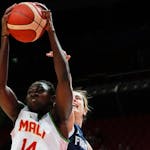 See
more of the story
See
more of the story
After all of these years together, on the cusp on another championship, the Minnesota Lynx's best players looked strangely lost.
Point guard Lindsay Whalen, the savant in high-tops, tried to dribble through mosh pits, as Los Angeles' guards trapped and bullied her in the last minutes of Game 5 of the WNBA Finals. The Lynx turned the ball over on consecutive possessions and what had been a 12-point lead with less than two minutes remaining stood at three points as the clock ran down to a half-minute remaining in the game.
On the next possession, Maya Moore inbounded the ball to Seimone Augustus, who caught the pass as she neared half court, leaped and passed to Sylvia Fowles.
Moore sprinted across the court, took a handoff from Fowles, power-dribbled to the left wing, cut to the free-throw line, jumped off her left leg and swished a difficult jump shot.
Before that play, the Lynx were in danger of blowing a lead and for the second straight season blowing a title late in a championship Game 5. Then Moore, who had spent the game making plays that don't show up in the boxscore, made one that will embed itself in memories.
That kind of play used to be routine for Moore. The Lynx's offense relied on her scoring, and the attention she drew from defenses.
When the team acquired Fowles two years ago, an offense that had won three titles began to change. Moore has adapted in a way that we rarely see in sports, as Fowles became the regular-season and Finals MVP.
At the time of the deal, Moore ranked as one of the world's best players and a perennial MVP candidate. How often does an athlete with that pedigree willingly make way for a teammate who will alter roles and take away shots?
For all of the wordplay in professional sports about teamwork, pro sports are essentially a selfish enterprise. Players compete for a finite amount of money and playing time. During the last two seasons, Moore breathed new life into every sports cliché about togetherness. A great player in her prime accepted a lesser role, and never complained publicly even as she produced her lowest-scoring season since 2012.
Moore has changed in another way. When she arrived in Minnesota, she was friendly with fans and accessible to media, intent on promoting her sport, but during interviews she maintained a wariness, a distance. She was remindful of Derek Jeter, who took on every question without offering any glimpses into his soul.
These days, Moore is relentlessly engaging. Among prominent Twin Cities professional athletes, perhaps only Torii Hunter in recent years has matched her combination of star power, accessibility and quotability. And as beloved as Hunter was, he never ranked as high in baseball's star hierarchy as Moore does in women's basketball.
As the Lynx celebrated late Wednesday night, the thought arrived: This is what sport is supposed to look like. These are people who care more about winning and each other than whatever else their sport might bring.
I've been lucky to cover the Lynx stars in four countries and three Twin Cities arenas, and what is often revealed in conversations with them was on display on the Williams Arena floor.
While they all deserve praise, only Moore had to change to make this team work.
"I don't know if you're going to get a more deep, committed, selfless group than we have right now,'' Moore said. "`You have talent, but the people that make up this organization, it would be really hard to find again, top to bottom.''
Moore and her teammates have proved that true over seven seasons, but it was Moore who made the greatest sacrifices.
Moore isn't an ambassador for the WNBA, or female athletes. She's an ambassador for sport.
Jim Souhan's podcast can be heard at MNSPN.com. On Twitter: @SouhanStrib. • jsouhan@startribune.com






